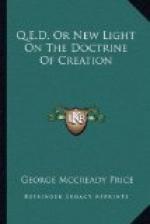The glorious flood of vitality, so prodigally lavished upon our world in the beginning, has been ebbing lower and lower; and the theory of organic nature steadily advancing from the lower to the higher is manifestly just as puerile as the old hope of creating energy by a perpetual-motion machine,—and a mistake of precisely the same nature. Both are contradicted by the magnificent law of the Conservation of Energy, which, as we have said, is only the scientific expression of the Scriptural statement that Creation is completed, so far as our world is concerned; though, as the “wages of sin,” death has been decreed upon the individual, and degeneration more or less marked upon every organic type. The fossils of the past, as well as our own experience within the historic period, confirm the view already arrived at on other grounds that Creation is a completed work and is not now going on; and the universal testimony from organic nature is that degeneration and decay have marked the history of every living form. Just as the individual grows old and dies, so do species degenerate and become extinct.
III
LIFE ONLY FROM LIFE
“No biological generalization rests on a wider series of observations, or has been subjected to a more critical scrutiny, than that every living organism has come into existence from a living portion or portions of a pre-existing organism."[3]
“Was there anything so absurd as to believe that a number of atoms, by falling together of their own accord, could make a sprig of moss, a microbe, a living animal? ... It is utterly absurd.... Here scientific thought is compelled to accept the idea of creative power. Forty years ago I asked Liebig ... if he believed that the grass and flowers, which we saw around us, grew by mere mechanical force. He answered, ’No more than I could believe that a book of botany describing them could grow by mere chemical force.’"[4]
“Let them not imagine that any hocus-pocus of electricity or viscous fluids would make a living cell.... Nothing approaching to a cell of living creature has ever yet been made.... No artificial process whatever could make living matter out of dead."[5]
[Footnote 3: P.C. Mitchell, in Encyclopaedia Britannica, Vol. III, p. 952.]
[Footnote 4: Lord Kelvin in the London Times, May 4, 1903.]
[Footnote 5: Lord Kelvin, to a class of Medical Students, October 28, 1904.]
I
Ever since Rene Descartes, in his Holland laboratory, dissected the heads of great numbers of animals in order to discover the processes of imagination and memory, men have been seeking a physical or materialistic answer to such questions as, What is life? What is it to be alive? How shall we distinguish the living from the not-living?




